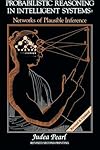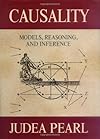Judea Pearl
Auteur van The Book of Why: The New Science of Cause and Effect
Over de Auteur
Judea Pearl is a professor of computer science and statistics at UCLA, winner of the 2011 Turing Award, and the author of three classic technical books on causality. He lives in Los Angeles, California. Dana MacKenzie is an award-winning science writer and the author of The Big Splat, or How Our toon meer Moon Came to Be. He lives in Santa Cruz, California. toon minder
Fotografie: Judea Pearl at the 2013 Conference on Neural Information Processing Systems. Better Than Bacon
Werken van Judea Pearl
Probabilistic Reasoning in Intelligent Systems: Networks of Plausible Inference (1988) 137 exemplaren
Problem representation research 1 exemplaar
Tagged
Algemene kennis
- Geboortedatum
- 1936-09-04
- Geslacht
- male
- Nationaliteit
- Israel
USA - Geboorteplaats
- Tel Aviv, Palestine
- Opleiding
- Technion (B.S.) (electrical engineering) (1960)
Newark College of Engineering (electrical engineering) (1961)
Rutgers University (physics)
Polytechnic Institute of Brooklyn (Ph.D.) (electrical engineering) (1965) - Beroepen
- electrical engineer
computer scientist - Relaties
- Pearl, Daniel (son)
- Organisaties
- IEEE (Fellow ∙ 1988)
American Association of Artificial Intelligence (Fellow ∙ 1990)
National Academy of Engineering (1995)
Spanish Academy of Engineering (Corresponding Member ∙ 2002)
American Academy of Arts and Sciences (2012)
Cognitive Science Society (Fellow ∙ 2011) (toon alle 7)
University of California, Los Angeles - Prijzen en onderscheidingen
- Lakatos Award (2001)
Allen Newell Award (2003)
Benjamin Franklin Medal (Computers and Cognitive Science, 2008)
David E. Rumelhart Prize (2011)
Turing Award (2011)
Harvey Prize (2012)
Leden
Besprekingen
Lijsten
Prijzen
Misschien vindt je deze ook leuk
Gerelateerde auteurs
Statistieken
- Werken
- 10
- Leden
- 1,363
- Populariteit
- #18,859
- Waardering
- 3.8
- Besprekingen
- 11
- ISBNs
- 35
- Talen
- 5
- Favoriet
- 1














Now, Pearl's intended audience is clearly the machine learning community. Much of what he says will not sound particularly Earth-shattering to people in (or from) the social sciences. "You can't learn causality from data alone, you need a model!" is one of the book's core messages. It's hard to see an economist or political scientist disagreeing with it. You come up with a theory, you think up its observable implications, you test them. Even Pearl's proposal that we use mediation analysis won't sound exactly novel. Social scientists have been doing that, they just don't use that name for it (they call it "testing the theory's microfoundations"). Now, having abandoned political science and lived among the machine learning people for four years now, I can see how Pearl's message is important to his intended audience. And social scientists should read the book too because it intelligently discusses the limitations of tools like RCTs and matching.
In the end what Pearl proposes - that we use our knowledge of how the world works in order to formulate and test hypotheses - may turn out to be (deservedly) influential in the machine learning community, but it won't help fix the core problem with the social sciences, i.e., that social scientists can always twist their hypotheses - not to mention the very questions they ask - to accomodate their pet world views. And when the Democrat/Republican ratio is 6:1, as it is in political science, we can't trust that people will keep each other honest - they won't. Pearl discusses in passing the possibility that some day we may have machine learning algorithms capable of producing their own causal models. Maybe then the social sciences will be worth the money they cost taxpayers.… (meer)